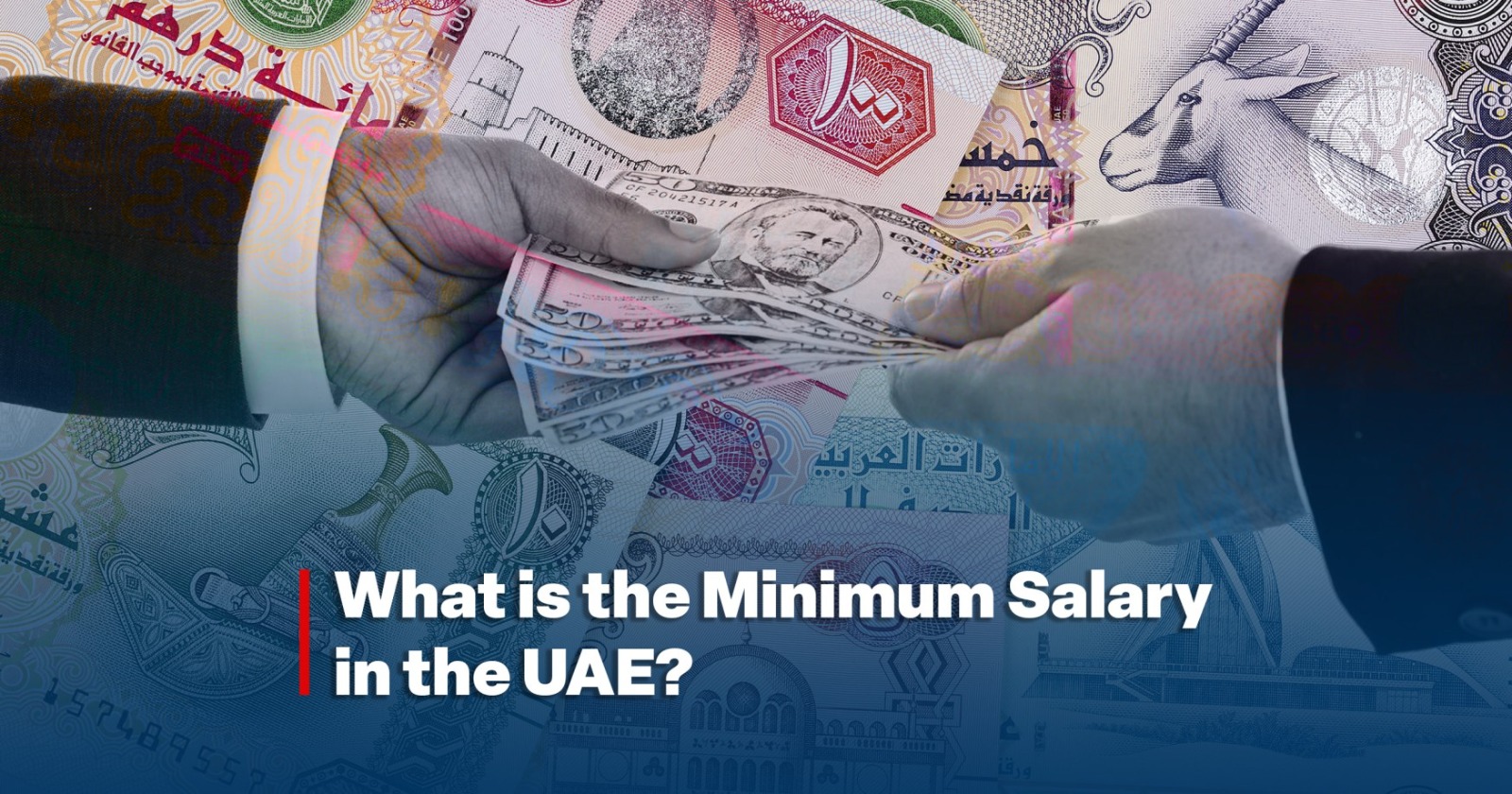Minimum salary in UAE often sparks questions among expats. Officially, there is no nationwide figure. However, data from Expatica shows that nearly 48% of foreign workers earn less than AED 2,500 monthly . Salaries instead depend on job type, education, and contract terms. Rules like the Wage Protection System (WPS) ensure timely pay, while family sponsorship requires AED 3,000–4,000. Curious which jobs pay far above this range?
Table of Contents
Toggle- What is the official minimum salary in uae?
- Why Doesn’t the United Arab Emirates Establish a Minimum Salary for All?
- Top Factors That Decide Your Salary in the UAE 2025
- What Jobs Offer Higher Pay Compared to the Minimum Salary in UAE?
- How is the Minimum Salary in UAE Applied to Expats?
- How Companies Set Salaries in the UAE?
- The Wage Protection System (WPS) in the UAE: How It Shapes Salaries
- UAE Labour &MoHRE’s role
- What is the future of minimum salary in UAE?
- Summary
- FAQ’s
What is the official minimum salary in uae?
The United Arab Emirates does not have a nationwide official minimum salary in uae that applies to all workers. Instead, it employs a system of salary guidelines and benchmarks tailored to various job types and qualifications. This allows for more flexibility and depends on a person’s skills and experience.
Workers without a high school certificate usually earn from AED 3,000. With a high school diploma, it rises to about AED 4,000. University graduates start from AED 5,000 or more. These figures may vary by sector, company, and job role. Always review contracts, since allowances and housing benefits often increase total income.
Why Doesn’t the United Arab Emirates Establish a Minimum Salary for All?
The UAE follows a flexible wage model. Salaries are linked to education, skills, job type, and emirate. This system keeps businesses competitive while workers remain protected through labor laws, contracts, and the Wage Protection System (WPS).
Key Reasons
- Free-market system
Wages vary by demand, skills, and industry needs. - No flat rate
Not every sector or region can be covered by a single compensation level. - Education matters
University graduates may start from AED 5,000, while unskilled jobs are lower. - Sector variation
Finance and IT pay more than retail or construction. - Emirate differences
Compared to Ajman or Ras Al Khaimah, salaries in Dubai and Abu Dhabi are higher. - Visa requirements
Some skilled roles require at least AED 4,000 monthly. - Worker protection
Salary payments are sent securely and on schedule thanks to the Wage Protection System. - Benefits and allowances
Housing, transport, and food often add major value to total income. Read more about Salary certificate in theUAE and how to get it.
Why the UAE Avoids a Universal Salary?
| Factor | Explanation | Example |
| Legal flexibility | MoHRE can set floors, but no one rule | Federal Decree-Law No. 33 |
| Education benchmarks | Higher study means higher pay | Graduate: AED 5,000+ |
| Sector variation | Wages differ across industries | Finance vs construction |
| Emirate variation | Cost of living changes by emirate | Dubai vs Ajman |
| Worker protection | WPS enforces timely payment | MoHRE wage records |
| Benefits & allowances | Packages include housing, transport | Total > basic wage |
This flexible wage model balances growth and fairness. Companies adjust pay to skills, roles, and market needs. At the same time, workers receive legal protection, secure payments, and additional benefits that raise real income.
2025 Market Salary Benchmarks by Profession
| Job Category | Representative Professions | Average Monthly Salary (AED) |
| Low-Skilled Labor | Construction Labourer, Unskilled Worker | 1,200 – 1,500 |
| Skilled Labor & Service | Retail Sales Assistant, Waiter, Security Guard | 2,000 – 4,000 |
| Technicians & Trades | Plumber, Electrician, Masons | 2,000 – 4,500 |
| Entry-Level Professionals | Administrative Assistant, Customer Service Rep | 2,500 – 6,500 |
| Mid-Level Professionals | Nurse, Teacher, Civil Engineer | 5,000 – 16,000 |
| High-Demand Professionals | Software Engineer, Financial Analyst, Doctor | 18,000 – 50,000 |
| Senior Management | Project Manager, CFO, General Manager | 20,000 – 100,000+ |
Industries with high demand, such as technology, finance, and healthcare, consistently offer higher salaries and are projected to see significant growth in 2025. Roles in these sectors, including AI engineers, cybersecurity specialists, and investment bankers, command premium compensation due to a shortage of specialized talent.
The Geographic and Demographic Divide
Salaries are not uniform across the country. Where one lives and works can significantly influence their earning potential. Major economic hubs like Dubai and Abu Dhabi generally offer higher average salaries than other Emirates.
Cost of Living vs. Average Salary by Emirate
| Emirate | Average Monthly Salary (AED) | Cost of Living Index | Rent Index |
| Dubai | 18,000 – 21,500 | 59 | 49.5 |
| Abu Dhabi | 18,000 – 21,000 | 53.9 | 35.4 |
| Sharjah | 15,000 – 25,000 | 47.3 | 21.6 |
While salaries in Dubai and Abu Dhabi are higher, so is the cost of living, particularly for rent. In contrast, Emirates like Sharjah and Ajman offer lower average salaries but have significantly more affordable living costs, especially for housing.
UAE Official Salary Benchmarks & Visa Thresholds
| Category | Salary Benchmark (AED/month) | Nature of Requirement |
| Emirati Citizens | Varies by qualification | Statutory |
| Family Visa Sponsorship | 4,000 (or 3,000 + housing) | Mandatory |
| Golden Visa | 30,000+ (for certain roles) | Mandatory |
| University Graduates | 12,000 | Advisory Guideline |
| Skilled Technicians | 7,000 | Advisory Guideline |
| Skilled Laborers | 5,000 | Advisory Guideline |
| Domestic Workers | 1,200 – 1,800 | Market Benchmark/Subject to WPS |
Nationality also plays a role in salary levels. Data indicates a significant pay gap between different nationalities performing the same role. One source highlights the following average monthly income ranges: Western expatriates (AED 20,000–35,000), Asian expatriates (AED 5,000–15,000), and UAE Nationals (AED 25,000–45,000). This is often due to variations in recruitment practices, perceived market rates, and a high supply of labor from certain countries.
Top Factors That Decide Your Salary in the UAE 2025
Salaries in the UAE depend on more than just your job title. They represent your location, industry demand, skills, and credentials. While there is no fixed minimum salary in UAE, contracts, visa rules, and government systems like the Wage Protection System (WPS) ensure fairness and stability. Understanding these elements helps workers set realistic expectations and negotiate better pay.
Learn more if you plan to move to Dubai and explore the best ways to do it.
Key Factors Affecting Salaries in the UAE
- Education level
Higher degrees or certifications often secure better pay. For example, a master’s holder can earn up to 25% more. - Experience
Senior professionals usually earn 10–15% more than mid-level staff due to skills and leadership roles. - Industry demand
Some sectors like finance, IT, and healthcare pay more than retail or hospitality. - Job role
Specialized skills (engineers, analysts, AI experts) raise wages compared to entry-level jobs. - Location
Salaries in Dubai and Abu Dhabi are higher, but so are rent and living costs. - Nationality
Packages may differ across expat groups, even though equal pay rules exist. - Company policy
Big businesses and multinational corporations frequently pay more than tiny local businesses. - Legal rules (WPS)
WPS ensures contracts are respected, making agreed pay enforceable just like a personal minimum salary in UAE. - Visa and sponsorship – To sponsor family, an expat must earn at least AED 4,000, or AED 3,000 with housing.
Factors Influencing Wage Levels in the UAE
| Factor | Effect on Salary | Example |
| Education | Higher study leads to higher pay | Master’s degree → 25% more |
| Experience | Seniority raises income | 10+ years → stronger package |
| Industry | Sector defines pay scale | IT vs Hospitality |
| Job Role | Specialist vs entry-level | Engineer vs Clerk |
| Location | City salaries differ | Dubai > Sharjah |
| Company Size | Larger firms pay more | MNC > Small firm |
| Legal Rules | WPS enforces agreed wages | Salary must match contract terms |
Salary Benchmarks by Industry (2025 Data)
| Industry/Sector | Sample Roles | Monthly Salary (AED) |
| Technology & IT | AI Specialist, Cloud Architect | 12,000 – 55,000 |
| Finance & Banking | CFO, Investment Banker, FinTech | 15,000 – 120,000 |
| Healthcare | Surgeon, Nurse, General Physician | 8,000 – 110,000 |
| Oil & Gas | Safety Officer, Engineer | 18,000 – 70,000 |
| Construction | Project Manager, Civil Engineer | 10,000 – 50,000 |
| Retail & Hospitality | Waiter, Sales Assistant | 4,000 – 15,000 |

UAE Labour Rules and Wage Protection
- WPS Requirement: Employers must pay wages electronically within 15 days of the due date.
- Visa Sponsorship: Expats need AED 4,000 monthly (or AED 3,000 with housing) to sponsor family.
- Equal Pay: For performing the same job, men and women should receive the same compensation.
- Penalties for Non-Compliance: Firms that delay salaries face work permit suspension, fines, or legal action.
WPS and Salary Protection
| Area | Effect on Salaries | Example |
| Timely payment | No late or missing wages | Paid within 15 days |
| Contract guarantee | Salary must match contract | Agreed amount always received |
| Sponsorship rules | Salary checked for visas | AED 4,000 or AED 3,000 with housing |
| Employer penalties | Action for non-compliance | Work permit freeze after 17 days delay |
| Transparency | Clear records for both | Proof available in MoHRE system |
Mainland vs Free Zone Pay Structures
| Feature | Mainland | Free Zone |
| Ownership | 100% foreign in most sectors | 100% foreign always |
| Market Access | Full UAE market | Limited, needs local agent |
| Visa Quotas | Linked to office size | Fixed by Free Zone Authority |
| WPS Rules | Mandatory for all companies | Some free zones allow flexibility |
End-of-Service Gratuity (EOSG)
Gratuity compensation is given to employees who have worked there for at least a year.
- 21 days of basic salary annually over the first five years
- After five years → 30 days of annual basic salary
- Maximum limit → Cannot exceed 2 years of total salary
| Years of Service | Formula Example (AED 15,000 basic) | Gratuity Amount |
| 4 years | (15,000 ÷ 30) × 21 × 4 | AED 42,000 |
| 6 years | (15,000 ÷ 30) × (21×5 + 30×1) | AED 67,500 |
Salaries in the UAE are shaped by education, skills, industry, and location rather than a fixed national rule. Although there is no single minimum salary in UAE, the Wage Protection System ensures every worker receives the pay written in their contract. For employees, this guarantees fairness and financial security. For employers, it promotes compliance and trust. Understanding these factors helps professionals make better career choices and secure stability in the UAE job market.
What Jobs Offer Higher Pay Compared to the Minimum Salary in UAE?
In the UAE, salaries differ by sector, skills, and company type. While there is no single minimum salary in UAE, many jobs provide higher pay that far exceeds basic thresholds. Knowing these roles helps professionals plan careers and negotiate contracts more effectively.
Jobs That Offer Higher Salaries
- Doctors and SurgeonsHealthcare experts earn AED 25,000 to AED 80,000 depending on specialty.
- Investment BankersSenior bankers in Dubai often make AED 40,000 to AED 100,000 monthly.
- IT and AI SpecialistsCloud engineers and AI experts earn AED 20,000 to AED 55,000.
- Oil and Gas EngineersSalaries range from AED 18,000 to AED 60,000 based on role.
- Pilots and Aviation StaffCaptains and senior crew can earn AED 30,000 to AED 60,000.
- Project ManagersExperienced managers in construction or tech earn AED 20,000 to AED 45,000.
- University ProfessorsAcademic staff receive AED 18,000 to AED 40,000, depending on rank.
- Legal AdvisorsCorporate lawyers often earn AED 25,000 to AED 60,000 monthly.
High-Paying Jobs vs. Minimum Salary in UAE
| Profession | Average Monthly Salary (AED) | Comparison to Minimum Salary in UAE |
| Doctor / Surgeon | 25,000 – 80,000 | 5–15 times higher |
| Investment Banker | 40,000 – 100,000 | 10–20 times higher |
| IT / AI Specialist | 20,000 – 55,000 | 4–11 times higher |
| Oil & Gas Engineer | 18,000 – 60,000 | 4–12 times higher |
| Pilot / Aviation | 30,000 – 60,000 | 6–12 times higher |
| Project Manager | 20,000 – 45,000 | 4–9 times higher |
| University Professor | 18,000 – 40,000 | 4–8 times higher |
| Legal Advisor | 25,000 – 60,000 | 5–12 times higher |
While there is no nationwide minimum salary in uae, several professions provide earnings far above the basic thresholds. From healthcare to banking, IT, and aviation, these roles reward expertise and demand. For professionals, understanding salary trends is the best way to plan careers, negotiate better packages, and secure long-term stability in the UAE.
How is the Minimum Salary in UAE Applied to Expats?
Expats planning to work in the UAE often ask about wages. The truth is clear: there is no official fixed minimum salary in UAE. Instead, pay depends on job type, education level, industry demand, and visa rules. The law, however, requires salaries to cover basic living needs, while the Ministry of Human Resources oversees compliance.
Key Rules for Expats
- There is no national minimum wage for all private sector jobs.
- Guidelines suggest:
- Graduates: AED 12,000
- Skilled technicians: AED 7,000
- Skilled labor (secondary education): AED 5,000
- Family sponsorship requires AED 4,000 monthly (or AED 3,000 with employer housing).
- Health insurance often needs at least AED 4,000 salary for full coverage.
- The Wage Protection System (WPS) ensures salaries are paid on time.
- Salaries vary across industries—finance pays higher than construction or hospitality.
- Employment contracts must state pay, allowances, and benefits in clear terms.
- Courts use contracts as reference during disputes.
- To draw in qualified foreign workers, government jobs might pay up to AED 50,000.
Minimum Salary Factors for Expats
| Scenario | Typical Threshold (AED) |
| No official minimum | None |
| Graduate (guideline) | 12,000 |
| Skilled technician (guideline) | 7,000 |
| Skilled labor (guideline) | 5,000 |
| Family sponsorship (with rent) | 4,000 |
| Sponsorship (with housing) | 3,000 |
| Health insurance (standard) | 4,000 |
| Government top roles | Up to 50,000 |
Real Earnings Across Jobs
Average salaries differ greatly. Negotiation, experience, and industry demand matter more than fixed rules.
| Profession | Monthly Salary (AED) |
| Investment banker | 45,000 |
| Project manager | 20,000 |
| Software engineer | 11,000–18,000 |
| Teacher | 10,400-15,000 |
| Nurse | 6,000–10,000 |
| Waiter | 4,000 |
| Domestic worker | 1,830 |
| Construction labor | 1,200–1,500 |
Salary vs. Cost of Living
- A single person often needs AED 10,000–15,000 for comfort.
- Families usually require AED 20,000–30,000 due to housing and schooling.
- Living costs in Dubai and Abu Dhabi are higher, yet salaries there are also higher.
What Shapes Your Pay
- Education: Higher degrees mean better pay.
- Industry: Tech, finance, and healthcare top the list.
- Experience: More years increase salary offers.
- Location: Abu Dhabi and Dubai are the best, but prices also go up
- Nationality: Pay gaps exist, with Western expats often earning more.
There is no official minimum salary in UAE, but several benchmarks, rules, and visa thresholds guide expat earnings. Your pay depends on skills, contracts, and market demand. Always review your contract, compare market salaries, and negotiate for benefits like housing, transport, and health insurance.
Explore unemployment insurance in the UAE in detail.
How Companies Set Salaries in the UAE?
- There is no single national minimum salary in UAE.
- The law requires salaries to cover basic living needs.
- Employers use salary guides and market benchmarks to set fair pay.
- Visa rules create thresholds, such as AED 4,000 monthly to sponsor a family.
- The Ministry of Human Resources and Emiratisation (MoHRE) suggests salary tiers for skilled workers and graduates.
- Through banks or authorized exchange houses, the Wage Protection System (WPS) guarantees that payments are paid on schedule.
- Salaries vary by job role, skills, and experience.
- Pay also changes by location; Dubai and Abu Dhabi offer higher salaries but have higher living costs.
- Together, these rules and systems make salaries fair, competitive, and transparent.
The Wage Protection System (WPS) in the UAE: How It Shapes Salaries
The Wage Protection System (WPS) is a government initiative that started in 2009. It was designed to make sure private sector employees are paid fairly and on time. The system requires companies to transfer salaries through banks or approved exchange houses, which creates a digital record of every payment. This balance protects employees, reduces disputes, and strengthens trust in the labor market. While the UAE does not have one official minimum salary in UAE, the WPS guarantees that the amount written in each worker’s contract is fully respected.
Why WPS Matters for Employees and Employers
- Workers get salaries on time because payments must be transferred within 15 days of the due date.
- Each transfer is tracked, giving employees clear proof of income.
- Employers gain a legal record that shows compliance with labor laws.
- Expats benefit because salary slips support visa and family sponsorship applications.
- Secure bank accounts or WPS payroll cards give workers easier access to financial services.
- Companies that fail to follow the rules risk fines, suspended work permits, or other penalties.
Salary Protection Under WPS
| Factor | What It Means for Salaries | Example in Practice |
| Timely payment | Workers always get paid on time | Wages are transferred within 15 days |
| Contract guarantee | Salary follows the contract terms | The full agreed amount is paid |
| Sponsorship rules | Salary level checked for visas | AED 4,000 or AED 3,000 with housing |
| Employer penalties | Firms are punished if rules are broken | Work permit freeze after salary delay |
| Transparency | Every payment is recorded clearly | The MoHRE system shows the full salary record |
How WPS Differs Across UAE Jurisdictions
- Mainland: All companies under MoHRE must follow WPS.
- JAFZA: Adopted WPS in 2012, with a strict deadline each month.
- DMCC: Enforced WPS from 2023 with strong penalties for late salaries.
- Meydan Free Zone: WPS not compulsory, which allows flexible payroll cycles.
Penalties for Breaking WPS Rules
- Salaries not paid on time → work permits can be frozen after 17 days.
- Wrong salary files (SIF) → AED 1,000 fine for each employee.
- Repeat infractions can result in increased fines, labor restrictions, and even legal action.
- Larger firms → heavier penalties per unpaid worker.
- Companies also risk a lower MoHRE rating, which affects their future growth.
Common Violations and Penalties
| Violation | Penalty Applied | Detail |
| Salary delay | Work permit suspension | Starts 17 days after the deadline |
| False salary data | Administrative fine | AED 1,000 for every affected worker |
| Repeat violations | Labor bans or prosecution | Can escalate to Public Prosecution |
What documents can support claims related to minimum salary in UAE disputes?
When facing wage disputes, key documents can help prove minimum salary in UAE claims. These include:
- Employment contract detailing agreed salary
- Payslips showing received payments
- Bank statements confirming salary deposits
- Wage Protection System (WPS) records from MoHRE
- Any written communication about salary issues
These records help workers and authorities verify compliance or unfair treatment.
Minimum Salary in UAE and WPS
The UAE does not fix one national minimum salary. Instead, guidelines exist for different levels of work:
- Graduates – around AED 12,000
- Skilled technicians – around AED 7,000
- Skilled labor – around AED 5,000
To sponsor family members, expats need AED 4,000 per month, or AED 3,000 if the employer provides housing. Under WPS, the contract amount becomes the worker’s personal minimum salary in UAE because it ensures full and timely payment.
Salary and Cost of Living
- Single professionals often need AED 10,000–15,000 to live comfortably.
- Families usually require AED 20,000–30,000 to cover housing, schools, and other needs.
- Dubai and Abu Dhabi pay more than smaller emirates, but expenses are also higher.
The Wage Protection System is not only a payroll method but also a safeguard for worker rights. It ensures every employee is paid the amount promised in their contract, on time, and through secure channels. For companies, it helps avoid disputes, penalties, and reputational risks. Even though there is no single minimum salary in UAE, WPS guarantees that agreed wages become enforceable, making the UAE labor market fairer and more reliable for both employers and workers.
UAE Labour &MoHRE’s role
The UAE has built a labour framework that balances economic growth with fair treatment for workers. From contract rules to wage protection, the system ensures that both locals and expats enjoy financial security and legal rights. While there is no fixed minimum salary in UAE, the government uses guidelines, contracts, and the WPS to make sure wages are paid correctly and on time.
MoHRE’s Role in Labour Protection
- The Ministry of Human Resources and Emiratisation (MoHRE) oversees labour relations.
- It issues work permits, labour cards, and approves contracts.
- MoHRE enforces wage rules and monitors compliance through the WPS.
- Workers can file complaints about delayed wages, unfair dismissal, or unsafe practices.
Key Labour Rules in the UAE
- Minimum working age is 15, with strict limits for those between 15–18.
- Working hours: There is a 48-hour workweek cap, with fewer hours during Ramadan.
- Overtime must be compensated at higher rates.
- Health insurance is mandatory for all employees.
- Equal pay laws require the same salary for men and women in identical roles.
- End-of-service benefits apply after one year of work.
- Anti-discrimination rules protect workers from bias based on gender, nationality, or disability.
UAE Labour Rights and Protections
| Area | Protection Rule | Example of Application |
| Minimum Age | Legal work starts at 15 | Students may work under training permits |
| Young Worker Limits | Safer jobs, no night shifts | Ages 15–18 restricted from hazardous work |
| Working Hours | 48 hours per week, with fewer during Ramadan | Ramadan shifts that are shorter |
| Overtime | Paid at higher rate | Based on contract hourly calculation |
| Health Insurance | Mandatory coverage | Employer provides medical plan |
| Equal Pay | Same wage for equal roles | Women in finance receive equal salaries |
| End-of-Service Pay | After one year of service | Gratuity for expats and citizens |
| Wage Payment | Through WPS | Prevents late or unpaid salaries |
The UAE labour system combines strict laws with electronic monitoring. The WPS ensures that salaries are paid on time and in full, while MoHRE manages contracts and worker rights. Even though there is no single minimum salary in UAE, guidelines, visa thresholds, and wage protection rules ensure that every worker has a secure income and clear legal rights. This balance creates a fair, transparent, and trusted job market for millions of expats and citizens alike.
What is the future of minimum salary in UAE?
Potential reforms include:
- Sector-specific minimum wages.
- Adjustments tied to cost of living5.
MoHRE may introduce binding rules under Article 27 of the Labour Law17.
Summary
The minimum salary in UAE is not officially fixed, yet wages depend on education, skills, and job sector. High-demand fields like finance, healthcare, and IT usually pay more, while smaller roles may earn less. The Wage Protection System (WPS) ensures employees receive timely and fair payments, supporting a transparent labour market. For new businesses in Dubai, understanding these rules is key. Business LinkUAE helps with company setup and compliance for long-term success.
Call our team today via phone at +97143215227, WhatsApp at +971502052735, or email at connect@businesslinkuae.com and get clear answers, expert advice, and hands-on help.
FAQ’s
Is the minimum salary in UAE the same in every emirate?
No, it varies from one emirate to another. Salaries depend on industry, emirate, and employer demand. Dubai usually offers higher wages in finance, trade, and real estate. Abu Dhabi pays more in oil, energy, and government roles. Sharjah and smaller emirates often provide lower pay, yet living costs there are also cheaper. This balance makes salary differences tied closely to cost of living and sector demand.
Is the minimum salary in UAE enough to cover living costs?
Living costs depend on lifestyle and emirate.
- One individual may spend between AED 4,000 and AED 6,000 each month in Dubai.
- In Sharjah, costs may be 30% lower.
Many employers add housing, transport, and medical insurance to make jobs attractive.
Is minimum salary in UAE required for family visa sponsorship?
Yes. To sponsor family members, residents must meet salary requirements set by UAE law. The standard threshold is AED 4,000 monthly, or AED 3,000 if housing is provided by the employer. These rules are designed to ensure that families have stable financial support while living in the country. Meeting this condition is essential when applying for dependent visas, as authorities check income proof through contracts and WPS records.
What should workers do if they are paid less than agreed?
Employees should first address the issue directly with HR or management. If the problem is not resolved, they can file a formal complaint with the Ministry of Human Resources and Emiratisation (MoHRE). Workers may use WPS salary records as proof of underpayment. MoHRE has the authority to investigate, impose fines, and even suspend employer licenses in cases of repeated violations, ensuring stronger protection of employee rights.




